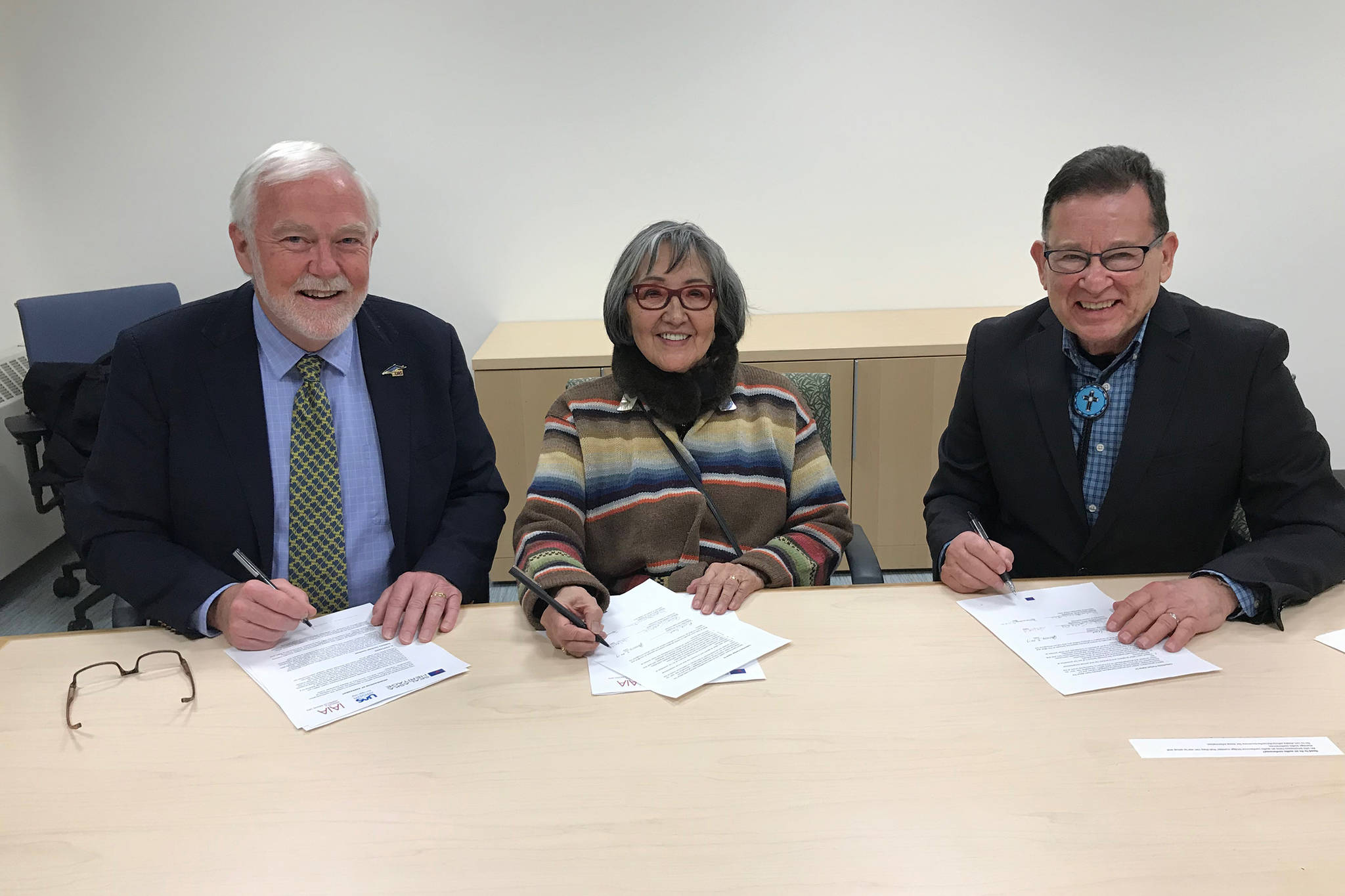UAS expands indigenous arts programs
Northwest Coast arts education continues to expand at the University of Alaska Southeast with a recent renewal of its agreement with the Sealaska Heritage Institute and the Institute of American Indian Art of Santa Fe, New Mexico.
UAS has been working with SHI and IAIA since late 2016 and continues to enhance and grow its Northwest Coast Arts programs, most recently by hiring Tlingit master carver Wayne Price as associate professor of Northwest Coast Arts.
Under the agreement, SHI will continue sponsoring a Native Artist Committee to provide advice and direction for development of programming. SHI will also provide access to the William L. Paul, Sr. Archives, ethnographic and art collections, and exhibits. Visiting artists will use space in the Delores Churchill Artist-In-Residence Studio or monumental arts space in the Walter Soboleff Building. Scholarships will be provided to qualified students.
UAS and IAIA will provide opportunities for Native students of all ages to have a “campus experience” and will work to make this experience as affordable as possible. The university and IAIA will support faculty exchanges to broaden arts education, and will work together to ensure that student credits transfer seamlessly between IAIA and UAS. As part of the agreement, IAIA will seek the appointment of Southeast Alaska Natives to sit on its Board of Trustees.
“It’s wonderful to see all the efforts bear fruit in short order. This is the place where NWC art and culture, language, performing arts, and art history can merge together for a better future for the next generation, to make a better world that we all share,” Price said in a press release.
To learn more about NWC arts and other programs available at UAS visit uas.alaska.edu/apply/programs or call 796-6100.
Juneau Arts & Humanities Council is not best contact for Norah Jones ticket questions
Live Nation is producing the upcoming Norah Jones concert and all ticket concerns should be directed to their customer service team.
Juneau Arts & Humanities Council shared a release Friday reminding those interested in attending the July 31 concert that while the event will be at Centennial Hall, the JAHC is not the entity bringing Jones to Juneau or resolving problems that may arise when purchasing tickets through TicketFly.
Live Nation’s support information and answers to frequently asked questions can be found at help.livenation.com.
Sealaska Heritage Institute condemns Facebook’s animal products sale
Sealaska Heritage Institute is condemning a Facebook ban on legal sales of products made from any “part, pelt or skin from an animal, including fur,” according to the site’s commerce policy.
The ban will have a devastating effect on Native artists throughout the state, who sell through Facebook and are dependent on the proceeds from arts and handicraft made from animal parts for their basic livelihood, SHI President Rosita Worl said in a press release.
“It runs counter to SHI’s efforts to establish sustainable arts-and-craft economies in rural communities where opportunities to earn a cash income are limited or non-existent,” said Worl, who noted support for a sustainable sea otter harvest and sale of handicrafts is also a priority of the Alaska Chamber of Commerce.
SHI became aware of the ban after Sitka skin sewer Robert Miller posted a sea otter hat for sale on Facebook and received a message Thursday saying it was not approved because it didn’t meet Facebook’s commerce policies. The artist then contacted Sealaska Heritage.
“This fur was harvested legally under the federal Marine Mammal Protection Act and this art practice has been part of our indigenous culture for more than 10,000 years,” Miller said. “I don’t understand why Facebook has put this ban in place.”
Worl has reached out to Alaska’s Congressional delegation to help advocate for a remedy to the issue.
“The sale of Native arts and handicraft arises from ancient traditions and has been a cornerstone of Native culture and societies for thousands of years,” U.S. Sen. Dan Sullivan said in the release. “Facebook has connected the world, and in particular remote Alaska communities and Alaska Native cultures. Unfortunately, Facebook’s ban, without recognizing or accommodating the legal right of Alaska Natives to produce and sell handicrafts, threatens to reduce the site’s positive impacts for the Alaska Native community. I would urge Mr. Zuckerberg to draw on his experiences traveling in our great State and his respect for our Native organizations, and amend Facebook’s policy to account for Alaska Natives’ traditions and legal rights.”

